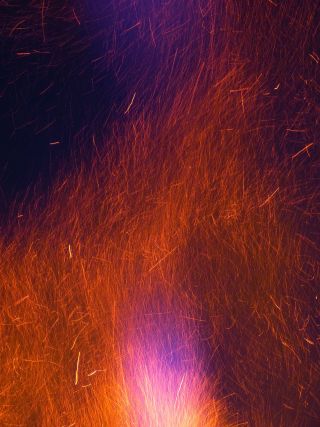Grief
The Maui Grief Effect: Complex and Chronic
Personal Perspective: What does this mean for future generations?
Posted October 10, 2023 Reviewed by Ray Parker
Key points
- The 2023 Maui wildfires caused multidimensional grief due to the loss of lives, homes, and possessions.
- Natural disasters have devastating impacts that extend beyond physical destruction.
- The failure of warning systems to go off during a wildfire in Maui caused people to lose trust.
- The Maui wildfires have highlighted the stark contrast between those who are privileged and those who are not.

Some time has passed since the Maui wildfires ravaged the island. The initial shock of witnessing the widespread devastation that unfolded before the eyes of Maui's residents has waned in the media spotlight.
Still, residents find themselves confronting the beginning of a deeply personal and shared journey through grief that will leave a lasting imprint on their lives for months and years to come. Even as the news cycle may have shifted its focus, the people of Maui have not. This experience will forever remain etched in their memories.
The destructive turn of a force more significant than the self is difficult to imagine.
The fires in Maui lit more than the land; they lit a sentiment of a people who now feel lost in their grief and mourning. They now face horrific emotional chaos, which often follows a genuinely traumatic experience.
Lives lost, histories annihilated, and safe spaces mutilated are reminders of a great divide that is now an inherent part of history. These emotions will go forward in each survivor's stories and new rituals. They will revive, revisit, and reinvent history, never to allow amnesia to take hold of what the brain wants to forget and yet cannot.
The cry of voices, people running from the smokey terrain, the terror of trying to get their breath back. These are all part of the memories that will bind them and hold them without consent. Nightmares will disrupt the hope for a peaceful night.
Anger and anxiety will surge within the mind and the body, looking for ways to change the course of the intense emotions. This is the depth of pain that only this kind of grief presents. The people of Maui are experiencing grief in response to the many forms of loss they've collectively and individually experienced.
A Time of Isolation
The aftermath of natural disasters can be incredibly isolating for those coping with loss, creating a cloud of grief that can feel suffocating. Grief is a multi-layered emotion, and when you add the pain of rebuilding a life that feels entirely new and unfamiliar, it's understandable that many people struggle to find any hope of healing through their grief.
The residents' experiences of Maui show us grief made more complicated by the multi-level losses and trauma associated with a natural disaster.
Grief After a Natural Disaster
The concept of grief after what is deemed a natural disaster isn't natural at all. It has an entirely different presence and effect. Breaking through to get to the truth is essential as grief shrouds the lives of many who can't return home.
For survivors, the aftermath of this traumatic event often leaves them in what I call the "Emotional Armor Phase" of grief. It's where the mind goes to soothe itself, even though it may not look as if any soothing is occurring to the outside world.
It's hard to imagine that numbness, shock, denial, and protest can be presented as soothers for the brain. Yet they are. They are the brain's way of protecting the self.
Normal, expected grief, and traumatic grief are different. They differ in the depth of the trauma caused. Many may feel lost so much more after experiencing a sudden disruption of one's life. The grieving process after a natural disaster can often be one step forward and two steps back as survivors navigate the physical and emotional turmoil caused.
But it's important to remember that everyone processes trauma differently and that there is no right or wrong way to grieve.
Grief Due to Lives Lost
The devastating impact of the Maui fire extends far beyond immediate damages to infrastructure and homes. The catastrophic event leaves a community in ruins, having to pick up the pieces while in a state of confusion, chaos, fear, and anxiety.
These emotions affix their presence to the questions most are asking: What's next? Where will I live? What will I do? How am I going to survive?
The long-lasting consequences reverberate from one generation to the next. The tragic loss of human life inflicts an emotional toll, giving rise to psychological effects like post-traumatic stress disorder (PTSD) and depression.
Collective trauma becomes ingrained in communities. Recovering from such profound loss, mental scars, and emotional pain can take years.
The aftermath of the 2023 wildfires in Hawaii has left an indelible mark on the affected residents. The loss of lives stands as a layer of grief experienced by survivors.
The emotional impact of losing loved ones in natural disasters is significant and leaves long-lasting scars. Families are left to grieve for a lifetime, profoundly affecting their mental and physical health. This grieving process is complex, as survivors endure various emotions, including hopelessness, anger, and sadness. They are making it difficult to heal.
Grief Due to Inequality
Natural disasters can cause devastation on multiple levels, including the emotional toll on survivors when faced with the stark differences between the "haves" and the "have-nots."
The profound contrast in access to essential resources like food, shelter, and medical supplies can profoundly impact a community, leaving lasting trauma. The Maui wildfires have torn through homes, communities, and lives, leaving many in shock.
However, beyond this tragedy, survivors are confronting another bitter reality: The glaring disparities between those who are privileged and those who are not. The awareness that some individuals have their basic needs met while others struggle to survive can have long-lasting effects on a community's well-being.
Those with resources and means are swiftly rebuilding their lives while recovering from the traumatic experience. Conversely, those without are struggling to obtain even necessities.
The sorrow and grief in the aftermath of the wildfires are amplified by the sobering realization that natural disasters tend to expose and exacerbate preexisting societal divisions and inequalities.
Grief Due to a Lack of Protection
During any natural disaster, it is crucial to have reliable warning systems in place to protect communities. The sirens, especially during a wildfire, provide people with notice and time needed to evacuate and seek shelter from harm. The failure of the sirens to go off in certain areas during the Maui wildfires led to mistrust among the people, who felt let down by those they believed would safeguard them.
The loss of care and protection shattered their confidence in those responsible for keeping the community safe. This sense of mistrust can exacerbate their newfound grief and anxiety and add further emotional distress.
Grief Due to a Loss of Possessions
When a natural disaster strikes, the immediate concern is for the safety of loved ones and neighbors. However, once the danger has passed and the rebuilding begins, another layer of grief and loss sets in—the loss of possessions.
While some may view grieving over material things as insignificant, the reality is that possessions are often symbols of our history and legacy. Heirlooms, pictures, and furniture may seem replaceable, but they hold deep sentimental value that often cannot be replicated. Their loss can cause deep-rooted sadness and feelings of hopelessness.
As the Maui community begins to rebuild after this tragedy, they must also confront the long and drawn-out process of rebuilding their homes and lives while constantly reminding them of the possessions they lost.
Here comes the rain again
Falling from the stars
Drenched in my pain again
Becoming who we are
As my memory rests
But never forgets what I lost
Wake me up when September ends.—Wake Me Up When September Ends by Green Day
By understanding the different layers of grief experienced, we can work towards developing mechanisms to support those who suffered from the wildfires' psychological effects. It is essential to remember that people need support and understanding and acknowledge and address the psychological impact of tragedies such as these.
To find out how you can help the victims of the Maui wildfires, visit Maui Wildfire Relief to make a financial donation, donate food and supplies, or volunteer. Aid for this fundraiser is distributed directly to the victims of the wildfire.




